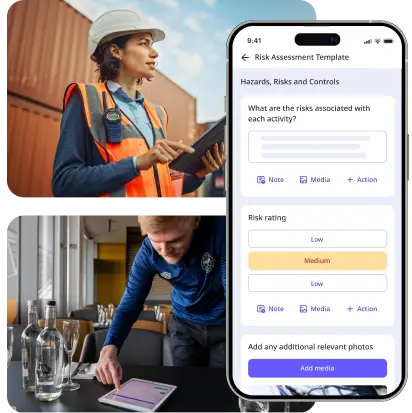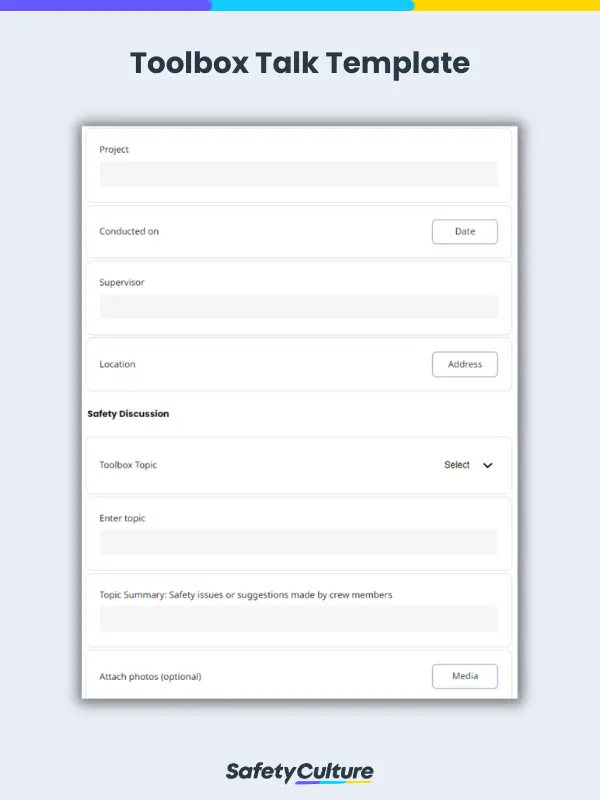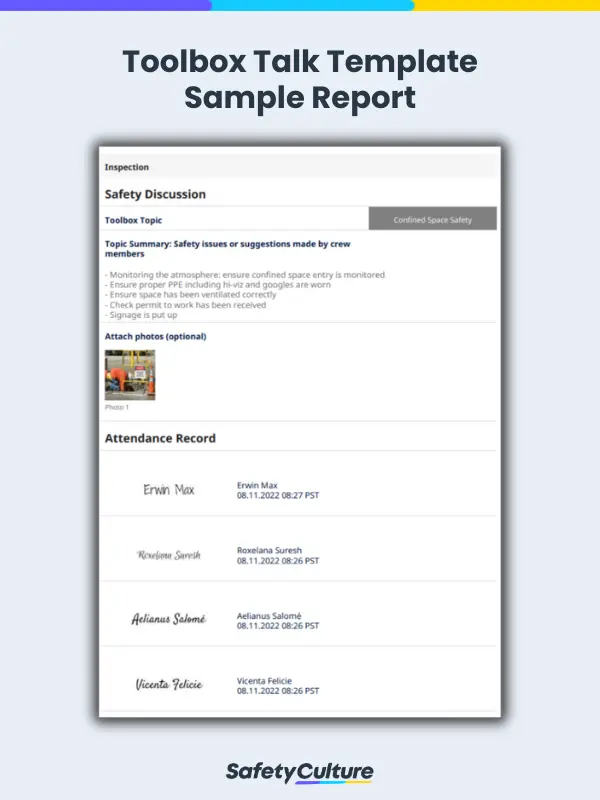What is a Toolbox Talk Template?
A toolbox talk template is a tool used by a team or group of workers during safety talks before commencing work. It can be used as a training guide and covers toolbox meeting topics. Conducting regular toolbox talks reduces workplace incidents and increases workers’ safety awareness.
Importance of Having a Toolbox Talk Template
Toolbox talks, also known as pre-start safety briefings, are quick and easily understandable safety discussions conducted before a certain shift starts at any job site. Although one session only takes about 5–10 minutes, it can cover a wide range of topics.
For this reason, a toolbox talk template, specifically one in a checklist form, can be helpful. A toolbox talk template can also serve as an official document you can refer to when identifying problems in the workplace and safety.
With a templated toolbox talk checklist, it becomes easier to create forms repeatedly, as everything is already in order. In particular, a toolbox talk template can help with the following tasks:
- Managing the toolbox talk topics to be discussed
- Collecting and understanding the responses of workers to specific questions
- Ensuring all safety protocols are remembered and hazards and risks prepared for
How Do I Write a Toolbox Talk Report?
Here is a simple guide to creating a toolbox talk report with a toolbox talk template:
- Conduct a toolbox talk discussion and indicate the topic.
- Provide a summary of the discussion by recording safety issues or suggestions made by crew members on your checklist template.
- Take photos of the meeting if necessary.
- Gather electronic signatures of the employees present for attendance purposes.
- Add remarks or overall recommendations.
- Sign off with a digital signature from the supervisor or manager.
What should you Include in a Toolbox Talk Template?
Depending on the needs of those who will use the template, a toolbox talk template should include the following general format:
- List of topics that are relevant to the work to be done
- Summary of events from the supervisor’s perspective
- Suggestions from employees regarding the topics discussed
- Attendance record of employees present at the talk
- Signature of the supervisor who conducted the toolbox meeting
See this example of a filled out toolbox talk form:
For example, in a construction site, various health and safety hazards will be present. With a toolbox talk template in the format of your liking, you can include the most common causes of accidents and injuries and share preventive tips on how to avoid them.
OSHA Toolbox Talk Examples
Some toolbox talks may have to be specific to the regulatory body guidelines. Here are some of the most commonly used toolbox talk templates you can use refer to when creating your own template :
- OSHA Toolbox Talk: Scaffolding Template
This template covers the essential safety measures for working with scaffolding, including proper assembly, use, and inspection procedures. It emphasizes the importance of fall protection and ensures that workers understand the risks associated with scaffolding. - OSHA Toolbox Talk: Confined Space Template
This talk focuses on the hazards of working in confined spaces. The template outlines safety precautions, necessary permits, and emergency procedures. It also stresses the importance of monitoring air quality and having a rescue plan in place. - OSHA Toolbox Talk: Excavation Safety Template
This template provides guidelines for safe excavation practices. It includes information on trench safety, protective systems, and hazard identification. - OSHA Toolbox Talk: Slips, Trips, and Falls Safety Template
Slips, trips, and falls are common workplace hazards. This template addresses prevention strategies, including housekeeping practices, proper footwear, and the importance of maintaining clear walkways. - OSHA Toolbox Talk: Chemical Safety Template
This talk emphasizes the safe handling, storage, and disposal of hazardous materials. The template covers Material Safety Data Sheets (MSDS), personal protective equipment (PPE), and spill response procedures.
FAQs about Toolbox Talk Templates
What should a toolbox talk include?
Who writes a toolbox talk report?
Why perform toolbox talks before commencing work?
What is discussed in a toolbox talk?




